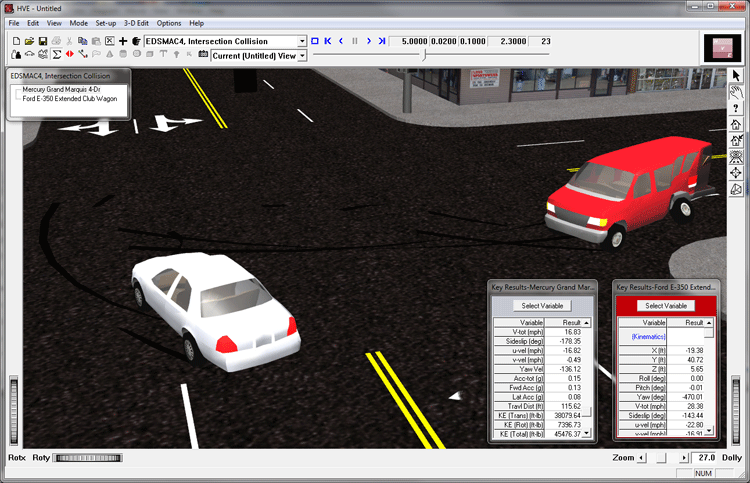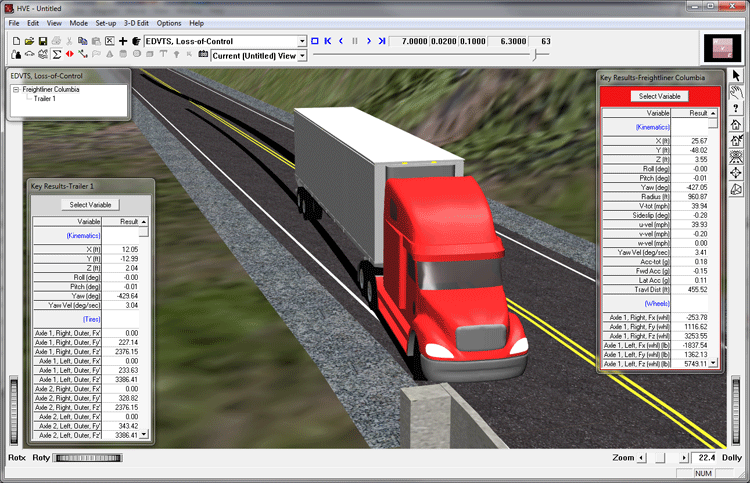EDC will be hosting the EDC Simulations Course as a virtual class . Please click on the link below for the registration form to sign up for the course.
Description
EDC Simulations offers the fastest way to learn how to efficiently use simulation to identify the causes of a crash and present your results with confidence. This one week course covers the key concepts of how the EDSMAC, EDSMAC4, EDSVS and EDVTS simulation programs work, how to collect the input data from your real-world crash investigations, how to use the programs to thoroughly analyze a crash and how to defend your results.

To provide a comfortable learning environment and to promote active participation, class sizes are limited to only 20 students. All course materials, including a handbook, training manual, software and temporary licenses will be provided. Bring your own laptop computer, as lectures are combined with hands-on computer exercises using real-world examples to enhance your learning experience. Exercises include single vehicle and vehicle-trailer loss-of-control and handling maneuvers, plus vehicle-to-vehicle collisions.

Course Outline
Note: times are Mountain Time
| Date | Time | Subject | Reference |
| Monday | 8:00-8:15 | Course Introduction | Notebook |
| 8:15-8:45 | Anatomy of a Simulation | Manual | |
| 8:45-9:30 | History and Application of Simulations | Manual | |
| 9:30-10:00 | Review of Coordinate Systems, CDC and Delta-V | Notebook | |
| 10:00-11:00 | Vehicle Dynamics Short-Course | Manual | |
| 11:00-11:30 | Program Menu Map | Manual | |
| 11:30-12:00 | Driver Input Tables | Manual | |
| 1:00- 2:30 | Estimating Initial Conditions | Notebook | |
| 2:30- 5:00 | EDSVS Demonstration Program, Input, Output, and Graphics | Manual | |
| Tuesday | 8:00-10:00 | Tire Models | Manual |
| 10:00-12:00 | Collision Models | Manual | |
| 1:00-2:00 | Case Study | Notebook | |
| 2:00-5:00 | Lab Exercise #1 - EDSVS | Notebook | |
| Lab Exercise #2 - EDSVS | |||
| Lab Exercise #3 - EDVTS | |||
| Wednesday | 8:00- 9:00 | Numerical Integration | Manual |
| 9:00-12:00 | EDSVS/EDVTS Calculation | Manual | |
| 1:00-5:00 | Lab Exercise #4 - EDSMAC | Notebook | |
| Lab Exercise #5 - EDSMAC | |||
| Thursday | 8:00-12:00 | EDSMAC Calculation Procedures | Manual |
| 1:00-4:30 | Lab Exercise #6 - EDSMAC | Notebook | |
| 4:30- 5:00 | Review | Notebook | |
| Friday | 8:00-8:30 | Presenting Your Results | - |
| 8:30-10:30 | Open Book Examination | - | |
| 10:30-12:00 | Post Examination Review and Course Closing | Notebook |
NOTE: This course focuses on the physics of EDSMAC, EDSMAC4, EDSVS and EDVTS, not on the HVE, HVE-2D or HVE-CSI user environment. For a list of excellent workshops that focus on the HVE, HVE-2D and HVE-CSI user environments, see HVE Forum.
Who Should Attend
Students who benefit the most from attending this course will typically have:
- Basic familiarity with either HVE, HVE-2D or HVE-CSI. (This is NOT a course on the HVE user interface.)
- A technical background in engineering or physics.
- Experience as accident investigators.
- A strong desire to improve their accident investigation skills.
If you use or are thinking about using EDC accident simulation software, you should attend this course!
About the Instructor
Mr. Terry D. Day, P.E., President of Engineering Dynamics Corporation received his Masters Degree from the University of Michigan and studied under researchers at the Highway Safety Research Institute. He is the author of numerous technical papers focused on the use of computers in accident investigation.
As an engineering consultant, Mr. Day has been actively involved in motor vehicle safety for over 30 years. He has also been a guest instructor for over 15 years at Northwestern University’s Traffic Institute. Mr. Day is still directly involved in the development of all EDC reconstruction and simulation software.
Certificates and Continuing Education Units (CEUs)
Students who attend the course and receive a passing grade on the Final Exam will receive a Certificate of Completion indicating their accomplishment and also the number of contact hours of instruction for PDH requirements. For those who are certified with the Accreditation Commission for Traffic Accident Reconstructionists (ACTAR) and wish to receive credit for continuing education, this course has been approved for 30 ACTAR CEUs.
Engineering Dynamics Company, LLC
503.644.4500
